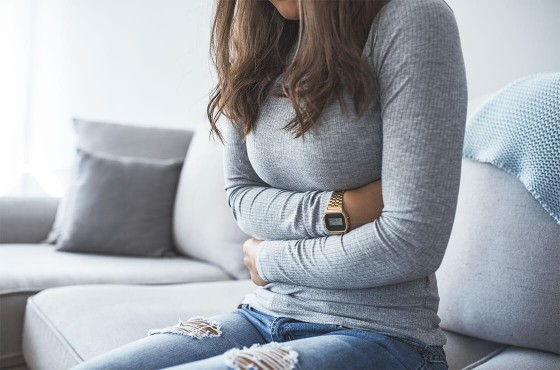Constipation:
who is most affected and how can it be relieved?
Written by Paul Musset, Doctor in Pharmacy | published on | updated on 15/04/2024

One of the most frequent causes of abdominal pain, even if it is often mild, is occasional constipation, which is capable of making everyday life difficult to bear. Why are women more often affected? What can be done about constipation? Are there any natural and effective remedies? Here are the answers to all these questions.
Reasons for slow intestinal transit
What does intestinal transit consist of?
As its name suggests, intestinal transit describes the digestive phase during which food moves through the intestines. This occurs at the end of digestion, once the food has been absorbed by the stomach and transformed into chyme (a kind of pulp containing partially absorbed food in the form of fragments).
This chyme then crosses the pylorus (junction between the stomach and the duodenum) to reach the intestinal tract. It is at this stage that difficulties related to slow transit (constipation) or accelerated transit (diarrhoea) may occur.
Chronic or occasional constipation: Multiple causes and symptoms
Constipation is commonly referred to as occasional constipation when there are less than three bowel movements a week for a short period of time. If this difficulty persists for several months, it may be considered chronic constipation. It then becomes more difficult to bear and manage on a daily basis.
Whether occasional or chronic, constipation and its symptoms vary from one person to another. It may involve:
- Stomach aches
- Feeling bloated
- Loss of appetite
Often benign, the causes of slow intestinal transit are quite varied. Leaving aside pathological or physical causes (malformations), it may be due to:
- A low-fibre diet
- A lack of hydration
- A lack of physical exercise
- Taking certain medications
- A sudden lifestyle change
- A hormonal change
Constipation: Women three times more likely to be affected
A question of hormones
Some studies have shown that women are more prone to constipation than men, especially at a specific time in their menstrual cycle: after ovulation and just before menstruation. Why? In fact, progesterone is the main cause. Its levels reach their peak at that time and its ability to relax the muscles relaxes the intestines just a little too much.
Constipation and pregnancy: Pregnant women at higher risk
While women are more affected by occasional constipation during their usual menstrual cycle, pregnant women are particularly affected by this phenomenon. Indeed, progesterone reaches a continual high level during gestation. This is why pregnancy is often synonymous with constipation.
What are the risks of constipation lasting too long?
Allowing constipation to develop is not recommended, as it is not without consequences. It can lead to:
• An anal fissure;
• Haemorrhoidal episodes;
• An intestinal obstruction requiring intervention
Constipation: What can be done and what natural remedies are there?
Constipation: What to eat to treat it
Diet is the first avenue to explore when suffering from constipation. A low-fibre diet can be responsible for your difficult bowel movements and fibre intake can be an initial effective solution to constipation.
This substance is present in many foods such as:
- Dried fruits and legumes (chickpeas, lentils, soya, etc.)
- Whole grains (rice, bread, oats, etc.)
- Green vegetables (beans, artichokes, spinach, etc.)
- Fruits
To help you re-establish a good transit time, it is best to adopt a healthy diet rich in foods that are effective against constipation.
Drink to eliminate
Eating correctly is one thing, but drinking enough is also essential. Indeed, many people wait until they feel thirsty before downing a large glass of water. Unfortunately, it’s too late, because thirst is a sign that your body is already lacking hydration. It needs water to function properly. It is recommended to drink 1.5 litres of water-based beverages every day.
To improve your transit, get moving!
A lack of exercise can cause constipation. But what is the relationship between exercise and constipation? It all comes down to musculature. Regular physical activity helps to strengthen the core muscles.
These muscles play an essential role in intestinal transit, as they help push food toward being evacuated. But it is not necessary to engage in excessive sports to put an end to constipation. A daily 30- to 45-minute walk is enough to keep your body in shape and to help your intestines fulfil their mission.
Natural solutions to relieve constipation
To help you quickly re-establish a good transit time and allow you to regain your sense of well-being, Cocooncenter offers food supplements based on:
- Fibre to improve frequency
- Medicinal plants or microbiotic strains to rebalance the intestinal flora
Phytotherapy is one of the most widely used natural means of treating constipation and other digestive problems. Here are two plant-based products we have selected for you:
The benefits of rhubarb
Rhubarb, half vegetable, half fruit, is a very good natural laxative. That is why it is found in many phytotherapy products that treat constipation, such as Juvamine’s transit aid. What makes it special? It combines rhubarb with other plants also known for their laxative properties, such as liquorice and marshmallow. Depending on the degree of constipation, one to three tablets per day are all it takes to help you re-establish a good transit time within a few days (do not take it for more than eight consecutive days).
Plant synergy for good digestion
By offering Aboca Sollievo Bio 90 tablets, Cocooncenter is focussing on the combined power of plants. This product contains the following in powder form:
- Dandelion roots, which stimulate the liver and gallbladder
- Fennel, whose seeds are known for their digestive properties
- Senna leaves (Cassia angustifolia), which help stimulate bowel movements by hydrating them
- Cumin, known as a very effective digestive spice
Dietary supplements are an effective way to treat constipation. However, without also eating a healthy and balanced diet, they lose all their benefits and transit problems are likely to persist. That is why, in any case, your first instinct when you become constipated is to take stock of your eating habits.
The three key points to remember about constipation:
- Proper hydration is the basis for a good transit time.
- For hormonal reasons, women are three times more likely to be affected than men.
- Constipation is not inevitable: there are natural ways to prevent and treat it.






















